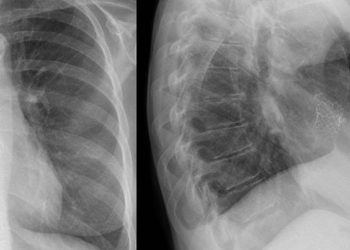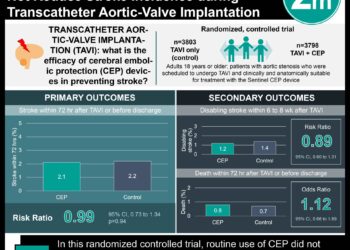Mediterranean diet effects on vascular health and serum levels of adipokines and ceramides
1. The effect of the Mediterranean Diet on cardiovascular health can be partially explained by improved vascular health, lowered total cholesterol and LDL, lowered ceramides, and reduced serum inflammatory adipokines.
Evidence Rating Level: 1 (Excellent)
Study Rundown: The Mediterranean Diet has been previously shown to improve cardiovascular outcomes in patients. This is proposed to be due to the reduction in saturated fat intake as it is replaced with vegetable (olive) oils. This study aimed to assess the diet’s effects on vascular health indices, lipid and ceramide profiles, and serum adipokine levels. Groups were randomized into a Mediterranean diet (Group A) and a low-fat diet (Group B) and followed for 12 months. Overall, the Mediterranean Diet was shown to significantly improve vascular health (measured by RHI), significantly reduce total cholesterol and LDL, improve ceramide profiles, and reduce inflammatory adipokines. These findings provide a better understanding of how the diet reduces cardiovascular disease risk.
Click to read the study in PLOS One
Relevant Reading: Primary Prevention of Cardiovascular Disease with a Mediterranean Diet Supplemented with Extra-Virgin Olive Oil or Nuts
A Ceramide-Centric View of Insulin Resistance
In-Depth [randomized control trial]: The Mediterranean-style diet is composed of low saturated fat and high vegetable oil intake and has been shown to play a key role in reducing cardiovascular diseases. By reducing saturated fat intake, plasma cholesterol is reduced which lowers the incidence of coronary heart disease. To further understand the impacts of a low saturated fat diet and cardiovascular disease, changes to ceramide levels were investigated. Ceramides have been implicated in selective insulin resistance and dyslipidemia. The study used a randomized control trial to evaluate the beneficial effect of a Mediterranean-style diet on three metrics over 12 months: vascular health indices; lipidemic and ceramide levels; and serum adipokine levels. Group A (n=101) was put on a Mediterranean diet whereas the control, Group B (n=52), was put on a low-fat diet. At baseline, Group A showed a significantly lower mean creatinine values (1.1 ± 0.4 vs. 1.4 ± 1.2, p = 0.010), significantly higher mean CRP values (11.1 ± 10.8 vs. 5.6 ± 7.3, p = 0.002) and significantly higher ejection fraction (EF) mean values (48.8 ± 8.8 vs. 27.1 ± 26.3, p <0.0005) than Group B. Group A also showed a higher serum resistin level than Group B (10.8 ± 1.5 vs. 10.2 ± 1.6, p = 0.037). To evaluate vascular health, the RHI metric was employed. RHI is an established technique for non-invasive assessment of peripheral microvascular function using pulse amplitude tonometry (PAT). A lower RHI is correlated to lower cardiovascular risk factors, including obesity, total/HDL cholesterol ratio, diabetes, smoking and dyslipidemia. Comparing the diets using a multivariable regression analysis, there was a significant clinical effect of the Mediterranean diet on RHI (p = 0.0001) over 12 months (T2). Evaluation of the lipid profile showed at 6 months (T1), Group A had a lower mean total cholesterol compared to Group B (144 ± 31.9 mg/dl vs. 163 ± 45.9 mg/dl, p = 0.003). Triglyceride levels also fell from T0 to T1 (p<0.05) in Group A. At T2, Group A had a significantly improved lipid profile with lower total cholesterol levels (134 ± 26.7 mg/dl vs. 156 ± 42.8 mg/dl, p<0.0005) and LDL levels (63.4 ± 23.5 mg/dl vs. 74 ± 18.0 mg/dl; p = 0.009). Ceramide profiles were also significantly affected by diet. Group A showed a significant reduction of ceramides C24:0, C22:0 and C18:0 at T2 (p<0.0005). The ceramides C24:0/C16:0 ratio increased at T1 and from T0 to T2 (p<0.0005). Finally, adipokine profiles were also improved in Group A over 6 and 12 months. Group A had higher levels of adiponectin, a glucose and lipid homeostatic factor at T1 (28.9 ± 2.9 μg/mL vs. 23.2 ± 4.3 μg/mL, p <0.0005). At T2, there was no change in adiponectin. Another adipokine that was affected by the diet was resistin. Though Group A had a higher baseline level, resistin levels decreased at T1 (9.7 ± 1.0 vs. 10.2 ± 1.1, p <0.0005) and again at T2 (8.2± 0.9 ng/ml vs. 10.2 ±1.1 ng/ml, p<0.0005). Overall, adherence to the Mediterranean diet showed improvements in vascular health indices (RHI), lipid profiles, ceramide concentrations, and a reduction in inflammatory adipokines. Ceramides are reported to be the converging point of overeating and metabolic abnormalities that increase risk of cardiometabolic disease. Lower ceramides indicate a better prognosis. A lower C24:0/C16:0 ratio seems to be inversely related to cardiovascular events. Both changes were seen with the Mediterranean diet. Some limitations include the heterogeneity and multivariable impacts of pre-existing medical differences between Group A and B. Group A had higher CRP levels, smokers, and chronic kidney disease. Also, as with all studies on nutrition and diet, adherence to the diets cannot be fully confirmed.
Image: PD
©2024 2 Minute Medicine, Inc. All rights reserved. No works may be reproduced without expressed written consent from 2 Minute Medicine, Inc. Inquire about licensing here. No article should be construed as medical advice and is not intended as such by the authors or by 2 Minute Medicine, Inc.







